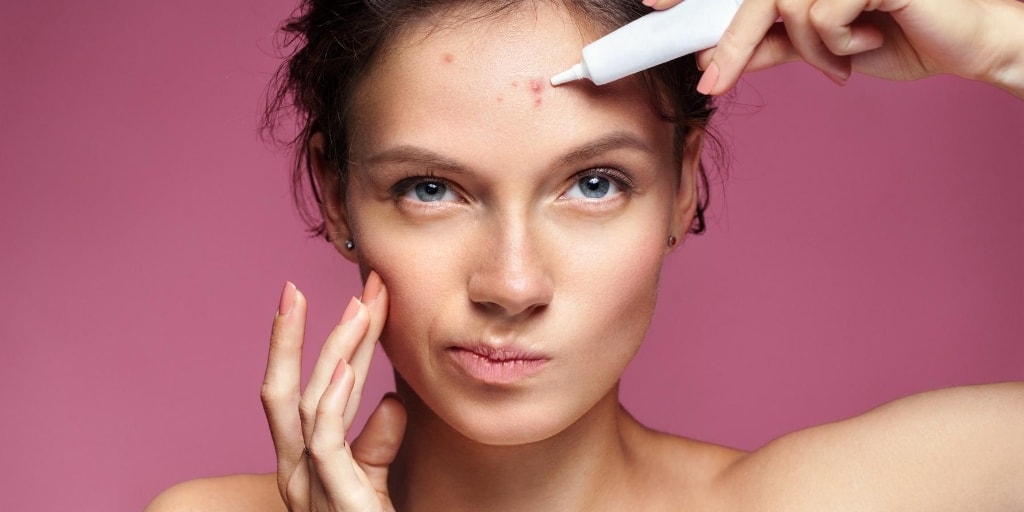For many of us that have struggled with acne, we know there are impacts far beyond a skin condition. Acne can influence our self-esteem, increase depression or anxiety, and sometimes make us feel self-conscious or unattractive. “It can be so frustrating when nothing that we try seems to work to improve it,” says Alison Acerra, MS, RDN, a registered dietician and MedShadow Medical Advisory Board Member. “When it is happening to our teenagers, it can be especially heart wrenching.” Whether you are a parent seeking options for your teen, or yourself battling this skin condition, you’ve likely noticed topical solutions on today’s market are geared toward continually treating the skin, but not resolve acne overall. Why not to try foods to combat acne ?
“[They] don’t get to the root of the problem,” says Acerra. “What if I told you that the key to overcoming these skin disturbances is really about balancing our health from the inside out? What we eat can actually be the key to clear, healthy, glowing skin. Nutrition can help us reach that radiant glow [on our skin] we’ve always wanted.”
Hormonal Fluctuations Cause Acne
Changes in our body’s hormone levels, such as those seen in teens or menstruating women, is a one culprit of acne, according to Acerra. The hormone levels fluctuate, and these changes cause the pores’ oil glands to produce more oil. Some of the ways people experience hormonal changes include the following:
1. Androgens: Puberty and Beyond
Acne is associated with androgen production. Androgens are a group of hormones that “play a crucial role in the development and maintenance of male characteristics,” explains Acerra.
“These hormones are present in both males and females,” she says. “They are typically at higher levels in males. The primary examples are testosterone and DHEA.”
Acerra says that androgens activate the sebaceous glands, or oil glands in the skin, which secrete sebum. An excess of sebum leads to clogged pores, creating an “environment conducive to acne development.”
Androgens don’t stop there. They also play a role in keratinization, in which skin cells become “stickier” and adhere to one another. This sticky situation is a contributor to the formation of “comedones” (or clogged pores), which also cause acne.
2. Inflammation
Inflammation in the body leads to hormone fluctuations. Increased androgens during puberty, PMS, and menopause, can also lead to inflammation of the skin. In addition to its role in many chronic issues, this inflammation can also lead to inflammatory acne lesions.
3. Stress-Triggered Hormone Changes
Stress hormones can activate and worsen acne. Hormones such as cortisol, can stimulate the sebaceous glands, and contribute to flare-ups of acne.
4. Polycystic Ovarian Syndrome (PCOS)
PCOS is a hormonal condition that, among other symptoms, can cause increased androgen levels. This imbalance may cause persistent acne in women with PCOS. These imbalances of hormones hallmarked by the condition cause irregular periods and increased facial hair.
5. Menopause
“Menopause is a period of the life cycle where women can experience acne,” says Acerra. “This is due to lowering estrogen. One of estrogen’s many roles is to protect the skin.”
Acerra says that while estrogen is dipping in menopause, androgens such as testosterone may not decline as rapidly.
“The relative increase in androgens, compared to that declining estrogen, can contribute to an imbalance [of hormones] that can increase in sebum,” she says.
Acne and Our Gut Microbiome
Outlining the root cause of acne, and the science behind it is helpful, but how do we control these things that are naturally happening in our body? Acerra says that a target for treatment “for many of these conditions, [the answer] lies in a pretty unlikely place: and that’s in our gut microbiome.”
“Our gut microbiome is crucial to the health of our skin,” she says. “It is also a target treatment for stabilizing hormones.”
Our gut is a home to trillions of microorganisms, collectively known as a microbiome. You can think of it as its own “habitat” with an environment of its own making. There, a fine balance of beneficial and harmful bacteria in the gut attempts to strike a balance. This balancing act can often influence our immune system and inflammation levels.
“An imbalance in the microbiome, what we call dysbiosis, can cause inflammation and other skin issues like eczema and psoriasis,” says Acerra. “It can also impact nutrient absorption and lead to deficiencies in the key nutrients that are going to protect the skin, such as essential fatty acids, zinc, vitamins A, C, D, and E.”
Additionally, complications with the gut’s biome can lead to even worse consequences, or a condition called “leaky gut.”
“Gut permeability, sometimes known as leaky gut, can allow toxins and undigested particles to enter the bloodstream,” says Acerra. “This is going to trigger an immune response and potentially acne.”
Foods to Combat Acne
Understanding the hormonal imbalances that provide the “stage” for acne to become present, not to mention a potential target for treatment in our gut biome, is a great foundation for deciding where to go next. So, what do we do?
“That [answer] is achieving and maintaining a healthy gut,” says Acerra. “When it comes to nutrition, we want to focus on what to do to really protect our gut, optimize and improve it, and get to that balance that we are looking for.”
Acerra recommends five foods to fight acne.
1. Include 25 to 35g of Fiber Each Day
Adding a healthy level of fiber each day is a great first step, says Acerra, who recommends fibers such as legumes, lentils, whole grains, fruits, vegetables, nuts, and seeds to gain these grams.
2. Make Some Fibers Prebiotic Fiber
While you are introducing more fiber into your daily diet, be sure to make some of those choices prebiotic fibers.
“That’s going to really help to improve the overall quality of bacteria in the gut,” she says. “Prebiotic fiber, in particular, such as resistant starches like unripe bananas, chicory root, garlic, onions, and sunchokes, is actually going to feed those healthy gut bacteria.”
3. Minimize Sugars and Refined Carbohydrates Foods to Combat Acne
These foods cause an overgrowth of the unhealthy bacteria. Additionally, these foods can lead to hormonal imbalances and therefore more acne. Our bodies are in a great state of attempting to reach and maintain balance. Eating poor food choices creates a vicious cycle of unwanted outcomes.
4. Eliminating Dairy and Gluten
For some sensitive individuals, the elimination of dairy and gluten can reduce inflammation. It can also be worth a try to eliminate these foods, slowly introducing them back into your diet to note the changes in your skin’s condition as you do so.
“[Eliminating dairy and gluten] can improve hormonal health and reduce acne,” says Acerra.
5. Choosing Whole- and Minimally-Processed Foods
By avoiding additives and preservatives, you can make strides in improving the health of your gut. Overall, the healthier our gut, the healthier our skin. The more whole and natural your food sources are, the less additives and preservatives you will take in overall.
Healthy Gut, Healthy Skin
One very important strategy in creating a healthier skin and reducing acne flare-ups is to address your gut health. Not only will this balance bring stability to hormones, but it, in turn, will also reduce your risks for acne and other sensitive skin issues.
“This focus will help you achieve more clear, radiant skin,” says Acerra.
If you have questions about nutrition, your diet, or how your choices impact your overall health, feel free to ask Acerra in our comment section below.






